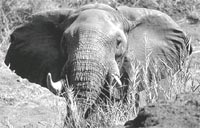SOUTH AFRICA
 Conservationists welcomed a 20-year jail term handed to an elephant poacher, saying stiff sentences were needed to protect the continent's endangered wildlife. "We can only applaud the fact the court has handed down a harsh sentence... we welcome any deterrent to would-be poachers,' Sarah Scarth, director of the South African branch of the International Fund for Animal Welfare ( ifaw ), told the Reuters news agency.
Conservationists welcomed a 20-year jail term handed to an elephant poacher, saying stiff sentences were needed to protect the continent's endangered wildlife. "We can only applaud the fact the court has handed down a harsh sentence... we welcome any deterrent to would-be poachers,' Sarah Scarth, director of the South African branch of the International Fund for Animal Welfare ( ifaw ), told the Reuters news agency.
A regional court sentenced Shalate Khoza after he was caught in the renowned Kruger National Park in July last year with elephant meat, an automatic rifle and nine rounds of ammunition, park spokesperson William Mabasa said. Khoza later took wardens to the carcass of a bull elephant he had shot for its 65 kg tusks. The sentence, the longest ever for a poaching case in South Africa, included 10 years for killing an elephant in a national park and 10 years for arms-related offences.
At the time of his arrest, Khoza was wanted for killing a black rhino in Kruger Park in September 1998, a crime which earned him a 10-year sentence. The 10 and 20-year terms will run concurrently. "This will send a clear message to poachers that they cannot go into a park and kill animals at will,' Mabasa told the news agency. "We need strong sentences to help our conservation efforts,' said Leo Braack, the head of the Kruger Park's conservation department. Mabasa said heavily armed poachers were also a threat to wardens and even to tourists in the country's game parks and needed to be treated as dangerous criminals. Kenya several years ago introduced a "shoot-to-kill' policy for dealing with poachers.
Related Content
- South African Renewable Energy Masterplan (SAREM)
- Learning Interrupted: Global Snapshot of Climate-Related School Disruptions in 2024
- Africa Solar Outlook 2025
- Blue and Green Drop Project Report 2024
- Global LNG outlook 2024-2028
- Empowering women for effective climate change adaptation: the role of the private sector
